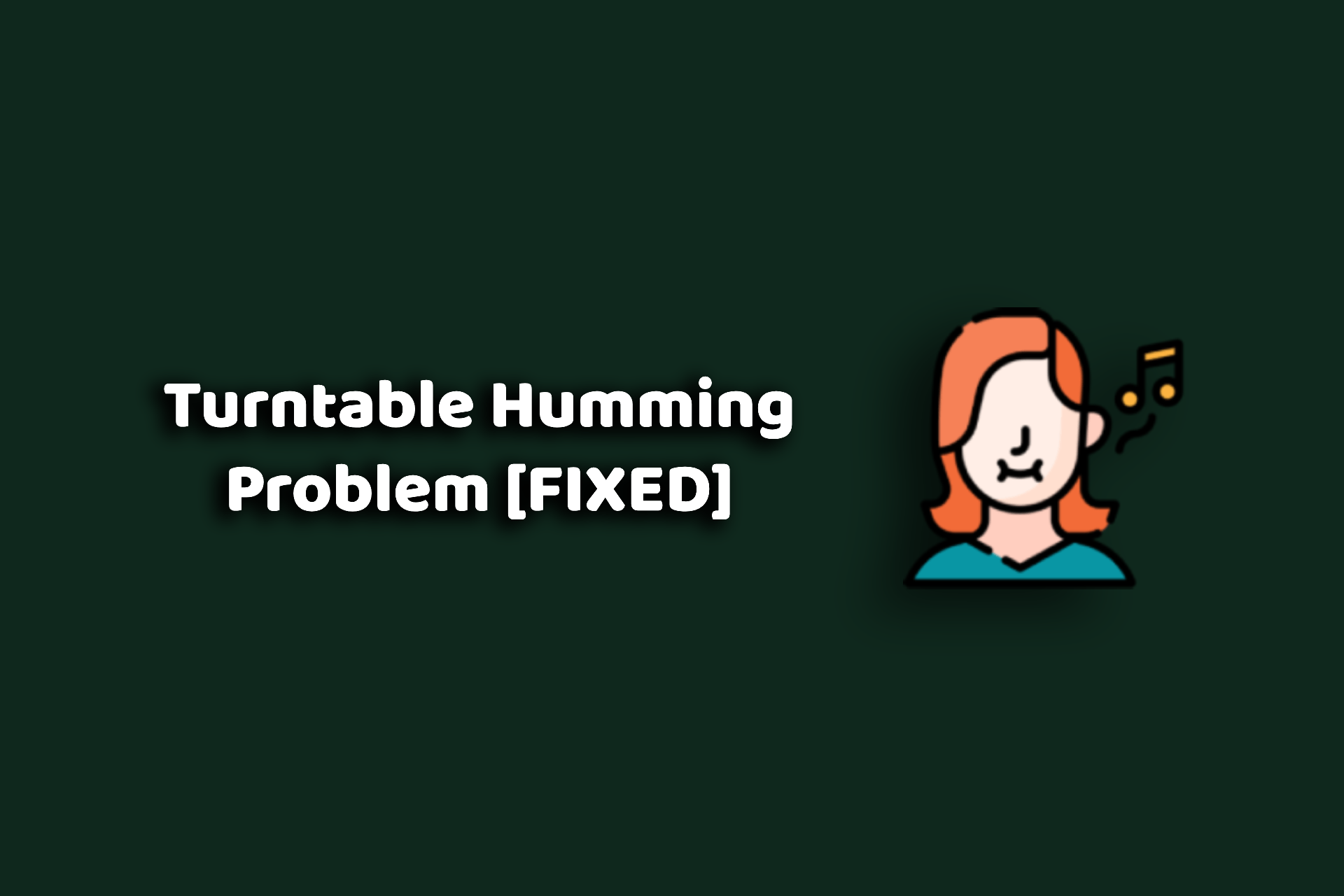Why Does My Turntable Hum?- The Ultimate Guide To Fix It
The continuous humming sound from your turntable can really take the fun out of the listening experience. It often creates unnecessary noise, interfering with the sound quality of your vinyl records.
When it happened to me, it drove me nuts. I checked the cables, adjusted the speakers, and even thought it was my old records causing the issue.
After numerous attempts, I eventually discovered the cause—and believe me, it was a simple solution I never would have guessed.
So, if you are experiencing the same irritating noise, let me help you save some time.
The following guide will look at all the possible causes of the humming of your turntable and the measures that you will need to take in order to eliminate the problem. Let’s get started!
What is Turntable Hum?
Turntable hum is the continuous, low-frequency buzzing noise that infiltrates your audio, disrupting the otherwise smooth, enjoyable vinyl listening experience.
In other words, a turntable hum is a noise that is caused due to various electrical interferences in the given audio system. It’s like static noise traveling through your system’s wiring, getting picked up by your turntable’s sensitive components, and feeding straight into your speakers.
While some hums are more common, others are trickier and not as well-known, which is why they can be harder to pin down.
What are the Different Types of Turntable Hum?
The different types of turntable hum include:
- 60-Cycle Hum: This is the classic hum most of us have faced. It is caused by improper grounding, where the electrical signals are not properly directed, which results in a ‘’buzzing loop’’ affecting your audio. At times, the fix may be as easy as reattaching a loose ground wire, while in other cases, the problem could stem from the power source.
- Magnetic Field Hum: Magnetic fields emitted by nearby electronic devices such as a TV, router, or refrigerator may disrupt the performance of your turntable’s cartridge. The cartridge is super sensitive and can pick up these magnetic waves, leading to that frustrating hum.
- Mechanical Feedback Hum: Ever noticed that when you turn up the volume, the hum gets louder? That could be mechanical feedback hum. It happens when vibrations from your speakers or even the surface your turntable is sitting on travel back to the stylus and cause a feedback loop. This type of hum is sneaky— it’s not just about bad grounding or cables. The physical setup of your turntable, like having it too close to speakers or on a shaky surface, can kick this into gear.
- Transformer Hum: This comes from the transformer inside your amplifier or preamp. Over time, transformers can develop hum due to wear and tear or lose windings, and that noise gets fed into your system.
What Causes Turntable Hum?
Turntable hum usually boils down to a few common issues, some of which are listed here:
Poor Grounding
Most turntables come with a little ground wire (usually hanging out near the RCA cables), and if that wire is not connected properly to your amplifier or receiver, there is a hum.
Sometimes, even if it looks connected, a loose or corroded connection can still cause hum.
When I first set up my system, I skipped this step and paid the price. And here’s something not everyone talks about: depending on your setup, grounding might still be necessary even if your turntable has a built-in preamp.
Interference from other electronics
Now, this one got me good. I placed my turntable right next to my router and laptop charger. Everything seemed fine at first— until the hum started coming in.
Turntables are sensitive to magnetic fields. Electronics like routers, phones and even power strips create interference that the cartridge can pick up.
Dirty power (Electrical Noise)
If your turntable is plugged into a power source shared with other electronics, especially high-powered devices like a TV or computer, it might experience electrical noise. This noise sneaks into your audio setup and causes that low hum.
Cartridge Misalignment
If the cartridge of your turntable is misaligned or not seated properly, it can also cause hum.
One more thing I would share here is some cartridges are more prone to picking up hum, especially in setups with unshielded cables or poor grounding.
Ground Loops
Ground loops are the evil twins of grounding issues. They happen when multiple grounding paths in your system cause electrical interference to loop through your equipment.
This is especially common if your components are plugged into different power sources. I had this issue when I plugged my amp and turntable into separate outlets across the room, and that’s when the ground loop hum showed up.
Vibrations from speakers or the surface
As mentioned above, sometimes, the hum is not electrical but mechanical.
If the speakers are in close proximity to the turntable or the turntable is on an unstable surface, vibrations can transfer from the speakers to the turntable, causing a feedback loop that results in a humming noise.
Phono Preamp Issues
If your turntable uses an external phono preamp, it can sometimes cause hum, especially if the preamp isn’t properly grounded or shielded.
How to Diagnose Turntable Hum?
Though we have mentioned the common causes behind why your turntable hums, here are a few more ways you can use to diagnose your turntable hum like a pro:
1. Listen to the hum- what does it sound like?
Start by paying close attention to the hum itself. The type of hum can actually give you clues. Is it a low, deep buzz that seems constant? That might indicate a grounding issue.
Or does the hum change in pitch as you move the volume knob? That could suggest interference from your speakers or another component nearby.
Understanding what the hum “sounds” like can help you figure out where it is coming from.
2. Unplug and Replug Components One by One
Start unplugging components in your audio system one at a time- your turntable, amplifier, preamp, speakers, etc. After each component is unplugged, listen for the hum. This process helps narrow down which piece of equipment is causing the hum.
If the hum disappears when a particular component is unplugged, you have likely found your suspect.
3. Move the Cables around
Cable crossing over one another is a surprisingly another common cause of turntable hum. I found this out the hard way when I had a bundle of power cords and RCA cables all tangled up behind my setup.
Start by separating the power cables from the signal cables—keep your RCA cables, speaker wires, and turntable power cord as far apart as possible. You’d be surprised how much difference it makes!
How to Fix Turntable Hum?
Here are 8 actionable steps you can take to get rid of your turntable hum and get your records playing smoothly again:
1. Check and Secure Your Grounding
This is the most common fix and one of the simplest to start with. If your turntable has a ground wire, make sure it’s connected securely to your amp or receiver’s ground terminal. A loose or poorly connected ground wire is often the root cause of hum.
Almost all turntables have a separate ground wire that needs to be securely connected to the ground lug on your phono preamplifier or main preamplifier.
The best-case scenario is when:
- The headshell is grounded.
- The tonearm is grounded.
- The chassis of the turntable is grounded.
These should all be connected through that ground wire. Without proper grounding, the ungrounded components can act like antennas, picking up noise and causing hum.
If your turntable doesn’t have a ground wire, try adding one yourself. I’ve even seen people use a simple piece of speaker wire connected to a metal screw on the turntable and another screw on the amp, and it worked like a charm.
2. Move Away from Electronics and Power Sources
Turntables are sensitive, and they don’t play well with other electronics that create magnetic fields, like Wi-Fi routers, laptops, or even power strips.
Moving your turntable away from your router can greatly reduce the hum. If you’re tight on space, at least try to keep the power and signal cables (like RCA) as far apart as possible—this reduces the chance of interference.
Also, try plugging your turntable into a different wall socket from your other electronics.
3. Upgrade Your Cables
Cheap or unshielded RCA cables are common for picking up interference. I didn’t believe this at first, but the difference was clear once I upgraded to shielded cables.
Look for high-quality, well-shielded cables to replace any old ones you’ve got in your setup.
And here’s something not everyone knows—keep your cables as short as possible. Longer cables are more likely to pick up hum and interference, so shortening them can sometimes help.
4. Separate Power and Signal Cables
I know this sounds basic, but it’s something we often overlook. Make sure your power cords and signal cables (like RCA or speaker wires) aren’t running parallel to each other.
Power cables create a magnetic field, and if they’re running too close to your signal cables, that hum can sneak in.
Try rearranging your cables so they cross at right angles rather than running alongside each other.
5. Adjust Cartridge Alignment
If your cartridge is misaligned, it might pick up interference from the motor or other components of the turntable.
I used a simple cartridge alignment protractor I found online to ensure everything was seated correctly. This didn’t just reduce the hum—it made my records sound clearer overall.
If you’ve never adjusted your cartridge before, now’s the time to check and fine-tune it.
6. Use Isolation Pads for Vibration Control
The vibrations from your speakers or the surface your turntable is sitting on travel through the turntable and mess with the stylus, creating that hum.
I invested in some simple vibration isolation pads and placed them under my turntable. The hum disappeared almost immediately.
If you’re dealing with this issue, you can also try placing your turntable on a more stable surface, like a dedicated turntable stand, to prevent vibrations from reaching it.
7. Try a Ground Loop Isolator
Sometimes, even after properly grounding your turntable, you’ll still hear a hum due to ground loops in your system.
This was a real headache for me, but I found that using a ground loop isolator was a lifesaver. You can plug it in between your turntable and amplifier, and it isolates the problematic signal.
It’s a quick fix and relatively cheap, so if you’re still struggling with hum, this might be worth a shot.
8. Check Your Preamp Setup
Some preamps are more prone to interference, especially if they aren’t well shielded. If your turntable has a built-in preamp (e.g., RT80 or RT81 models) and you’re still hearing hum, consider switching to an external, higher-quality preamp.
Say Goodbye to Turntable Hum and Bring Back the Magic of Vinyl!
Turntable hum doesn’t have to ruin your vinyl experience. By diagnosing the issue and making a few key adjustments, you can silence that annoying buzz for good.
Whether you ground your system properly, move away from electronics, or upgrade your cables, each step brings you closer to a hum-free setup.
I’ve experienced the same frustrations, but once you get everything sorted out, you’ll get that rich, warm sound you know and love.
So take a deep breath, follow these steps, and enjoy your music without the hum!

![Turntable Fast Spinning Problem [FIXED]](https://turntablely.com/wp-content/uploads/2024/09/Turntable-Fast-Spinning-Problem-FIXED-1-768x512.png)

![Record Player Repeating Problem [FIXED]](https://turntablely.com/wp-content/uploads/2024/09/Record-Player-Repeating-Problem-FIXED-1-768x512.png)
![Record Player Not Spinning Problem [FIXED]](https://turntablely.com/wp-content/uploads/2024/09/Record-Player-Not-Spinning-Problem-FIXED-1-768x512.png)